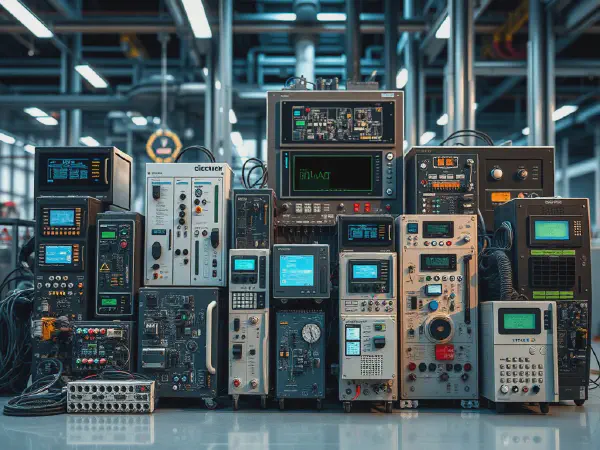Comprehensive Guide on Industrial Electronic Equipment

Understanding Industrial Electronic Equipment: Key Components and Future Trends
Industrial Electronic Equipment plays a crucial role in modern manufacturing and automation settings. These devices facilitate the control and monitoring of various industrial processes, ensuring efficiency and precision. From programmable logic controllers (PLCs) to industrial sensors, the significance of these systems is undeniable in today’s technologically advanced landscape.
For seamless operation in data processing, ensure to perform the latest qnavigator download and update your software regularly.
The adoption of Industrial Electronic Equipment has revolutionized the way industries operate. With the integration of electronics in industrial systems, companies can enhance their production capabilities, improve reliability, and reduce costs. Among the most commonly used devices are PLCs, which serve as the backbone of automation due to their flexibility and ease of programming.
Moreover, Industrial Electronic Equipment encompasses a wide variety of tools that include not only PLCs but also industrial sensors, variable frequency drives (VFDs), and automation systems. These components work together to create a seamless operation for complex industrial applications, making industries more competitive in a global market.
Integrating an advanced industrial motherboard can significantly enhance the reliability and scalability of your industrial systems.
As industries continue to evolve, the importance of Industrial Electronic Equipment compounds further. Companies are increasingly investing in advanced electronics to optimize their operations. This trend is driven by the demand for higher productivity, lower downtime, and enhanced product quality. Thus, understanding the diverse types of equipment and their functions is essential for any industrial organization.
This article explores the different types of Industrial Electronic Equipment, their applications, future trends, maintenance practices, and notable suppliers and manufacturers in the industry.
The new generation of industrial mini pc offers exceptional performance and energy efficiency for demanding applications.
Types of Industrial Electronic Equipment
One of the primary types of Industrial Electronic Equipment is Programmable Logic Controllers (PLCs). PLCs are industrial computers designed to automate specific processes or machinery. They are essential for controlling manufacturing lines, handling input/output operations, and managing various devices through programmable instructions.
Another vital component is industrial sensors and transducers. These devices are responsible for detecting changes in physical properties like temperature, pressure, and flow and converting these changes into signals that can be interpreted by control systems. Their accuracy and reliability are imperative for maintaining optimal operational conditions.
Industrial Automation Systems also fall under the category of Industrial Electronic Equipment. These comprehensive systems integrate various technologies, including PLCs, sensors, and control software, to automate complex tasks. They help streamline production processes, reduce human error, and improve efficiency.
Variable Frequency Drives (VFDs) control the speed of electric motors by adjusting the frequency and voltage of the power supplied to them. They are particularly useful in applications that require precise motor control, improving energy efficiency, and extending the lifespan of the equipment.
Applications of Industrial Electronic Equipment
Industrial Electronic Equipment finds its applications across multiple sectors, most notably in manufacturing and production lines. The ability to manage and optimize workflows through automation leads to enhanced productivity and quality assurance.
In recent years, the rise of Smart Grid Technology has revolutionized how electrical networks operate. Industrial Electronic Equipment plays a vital role in smart grids by allowing for real-time monitoring and control of energy distribution, thus enhancing efficiency and reliability.
Robotics and automation is another field significantly impacted by Industrial Electronic Equipment. With the integration of advanced electronics, robotic systems can perform complex tasks with precision and speed, which proves beneficial in various industries such as automotive, electronics, and food processing.
Process Control Systems rely heavily on Industrial Electronic Equipment for managing industrial processes. By maintaining optimal conditions and responding to variations in real-time, these systems help in achieving consistency and quality in manufacturing.
Future Trends in Industrial Electronic Equipment
The Internet of Things (IoT) is set to transform Industrial Electronic Equipment by enabling seamless connectivity between devices. IoT will facilitate real-time data collection and analysis, leading to smarter operations and improved decision-making processes.
Moreover, the application of Artificial Intelligence (AI) in Industrial Electronic Equipment will revolutionize automation and control processes. AI can enhance predictive maintenance, optimize operations, and drive innovation within industrial settings.
As environmental considerations take precedence, the demand for Sustainable Industrial Solutions is on the rise. Industrial Electronic Equipment that emphasizes energy efficiency and waste reduction will become increasingly essential in meeting regulatory standards and corporate sustainability goals.
Advancements in control systems are also anticipated, focusing on enhanced functionality, user-friendliness, and integration capabilities. These improvements will lead to more sophisticated automation solutions that cater to the needs of modern industries.
Maintenance of Industrial Electronic Equipment
Preventive Maintenance Strategies are crucial for ensuring the reliability and longevity of Industrial Electronic Equipment. Regular inspections, updates, and servicing can prevent unexpected breakdowns and prolong equipment life.
Troubleshooting Techniques are essential when issues arise. Knowledge of common electrical problems and a methodical approach to identifying faults can significantly reduce downtime and maintain productivity in industrial operations.
Calibration and Testing Procedures are integral for ensuring that devices operate within specified parameters. Regular calibration helps maintain accuracy and reliability, which is critical for process control.
Adhering to Safety Standards and Compliance is non-negotiable. Ensuring that Industrial Electronic Equipment meets safety regulations protects workers and minimizes the risk of accidents in the workplace.
Suppliers and Manufacturers of Industrial Electronic Equipment
Leading Brands in the Industrial Electronic Equipment sector focus on innovation and quality assurance. Companies like Siemens, Allen-Bradley, and Schneider Electric have made significant advancements, providing state-of-the-art solutions that meet the evolving needs of industries.
Choosing the Right Supplier for Industrial Electronic Equipment is crucial. Factors to consider include product reliability, customer support, and the availability of technical resources. A reputable supplier can make a notable difference in operational efficiency.
Global Market Trends indicate a growing demand for automation and control solutions across various sectors. As technologies evolve and industries expand, the market for Industrial Electronic Equipment is poised for continued growth and innovation.
Industry Certifications and Quality Assurance play a vital role in ensuring that Industrial Electronic Equipment meets specified standards. Certifications such as ISO and CE are essential for instilling confidence in the quality and performance of industrial electronic products.
